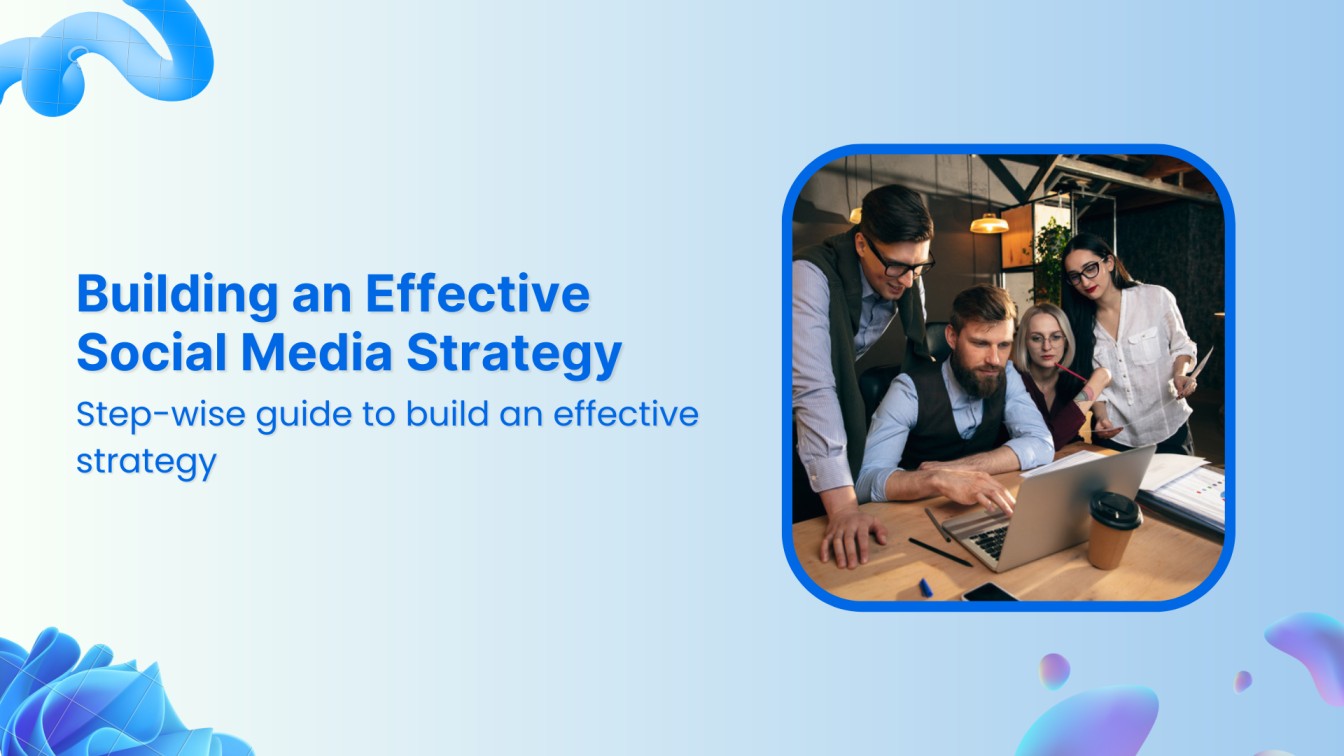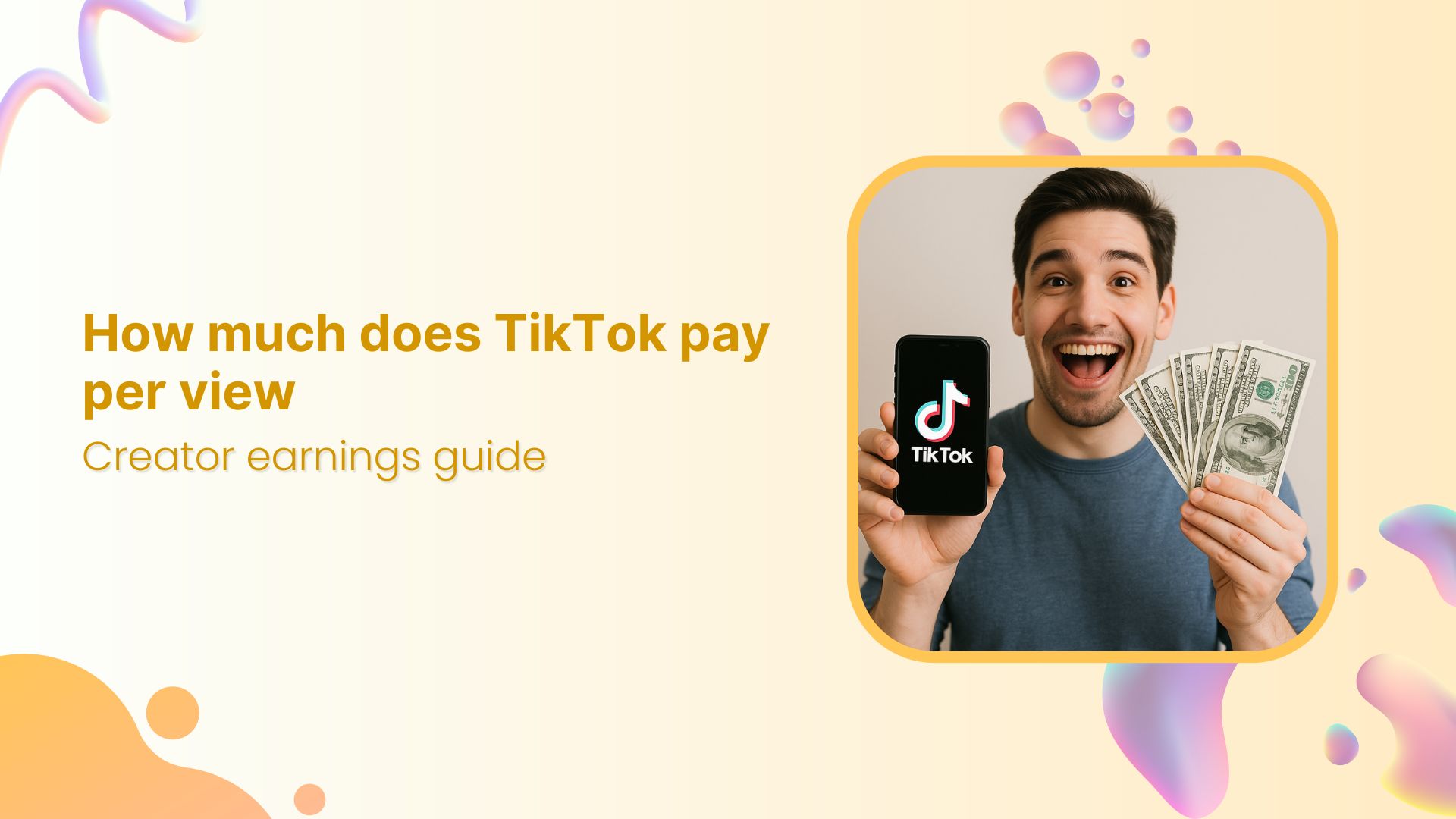Bulk-generate & schedule posts in seconds with Smart Scheduling. Try now!
X(Twitter) impressions: Strategies for growth and engagement
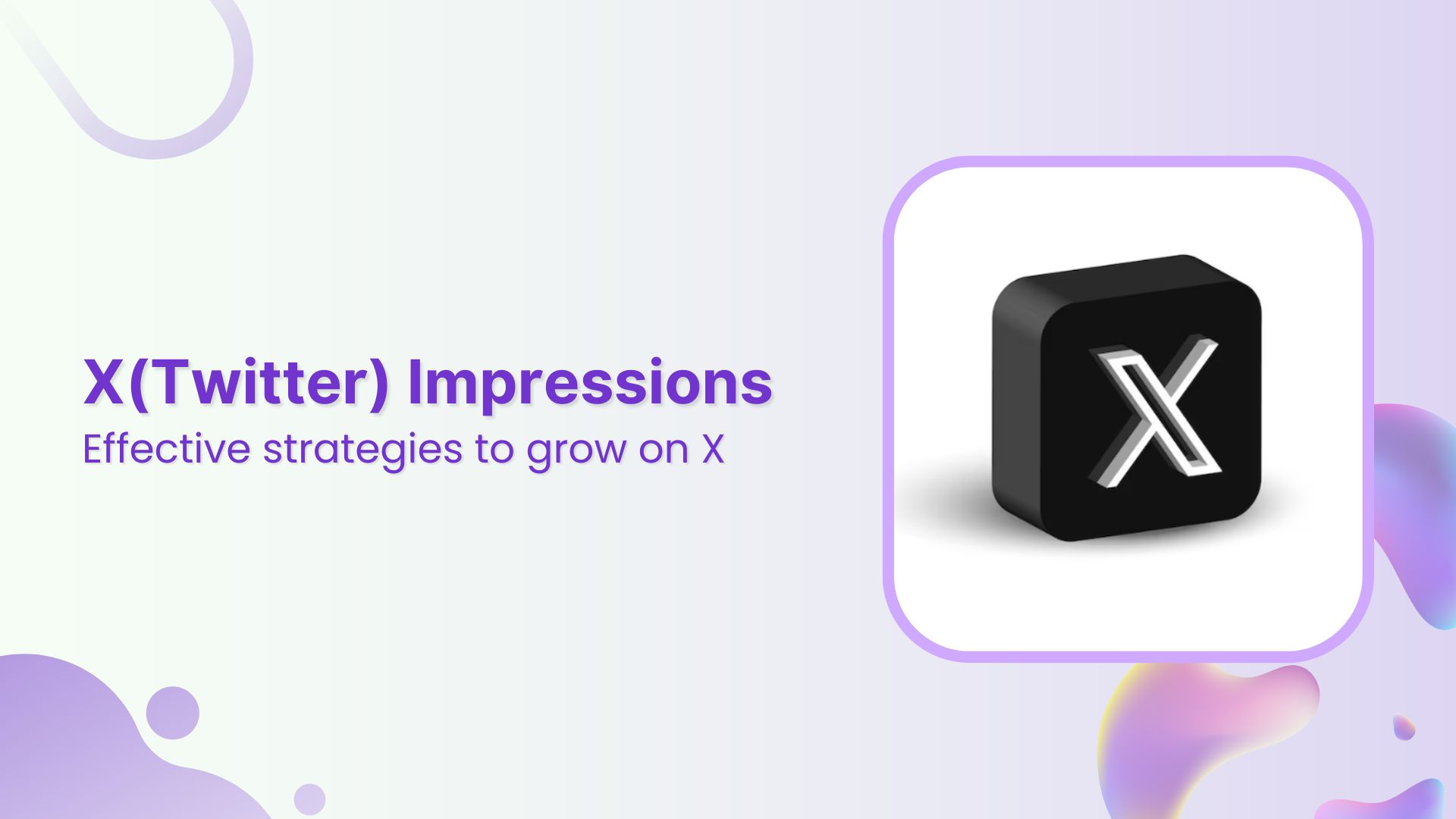
If you’ve only started out on X(Twitter), you’re likely chewing on a nail — wondering how to increase your Twitter impressions to increase your likes and followers on the bird app.
Related read: How to go viral on X(Twitter) in 2025
Truth be told: Impressions on X are a crucial performance metric. But what are they exactly, why do they matter, and how can you increase them?
Fortunately, once you have a comprehensive answer to these questions, X will become a little less overwhelming, which will help you unlock success on the social app.
X (Twitter) Marketing
Schedule perfectly crafted tweets and manage your X (Twitter) content with a unified content calendar.
Get Started for FREE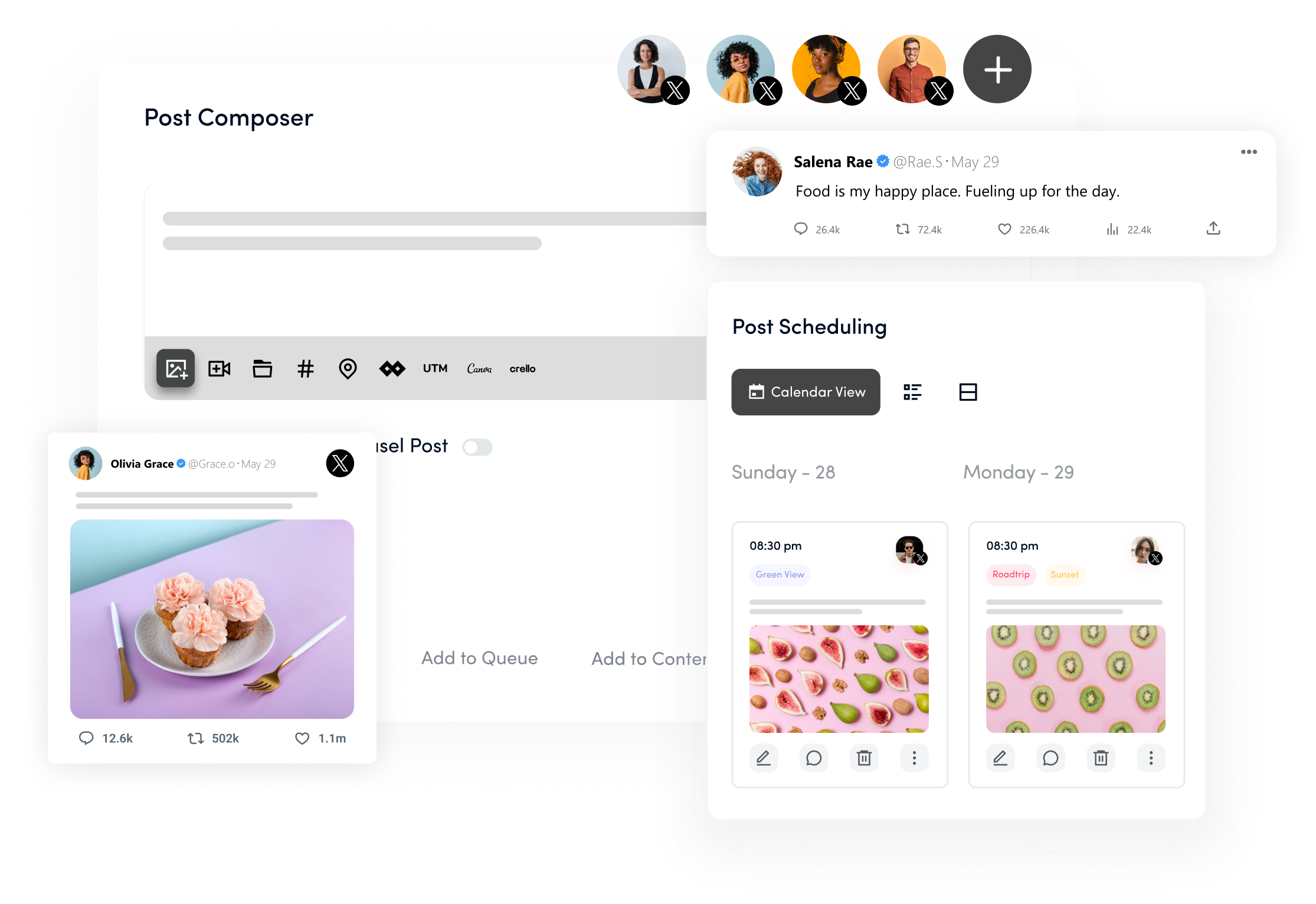
So, in today’s piece, let’s guide you through the X(Twitter) impressions territory. In addition to discussing what impressions are and how to increase them, we’ll cover how X impressions differ from X reach.
What’s more, we’ll answer why impressions are important and where you can find them so that you can better refine your X(twitter) marketing strategy.
What are X (Twitter) impressions?
The short definition: impressions on X refer to the number of times a tweet is seen.
For instance, you post a status on X, and about six followers see it on their timeline. This means your tweet has at least 6 impressions.
However, X impressions aren’t just the number of times your followers see your tweet. In fact, it is the total number of times anyone on X sees your tweet.
This means your impression will grow when someone searches for a hashtag you’ve used in your content and comes across your tweet.
Also read: How to use hashtags for your social media posts
In short, impressions include the number of times your tweet is seen by anybody in the search results — your followers and non-followers alike, as a tweet response or through a hashtag.
So, whoever sees your tweet on the X app, whether or not they interact with it, their view counts as an impression.
An important thing to note here is that impressions include repeated views, as in multiple views from the same user.
Impressions, however, do not cover the number of times your tweet is seen through a third-party app or as an embedded tweet on a blog.
Why do X(Twitter) impressions matter?
As a golden rule for success on any social media app, always aim to increase your content views. After all, when your content is seen, it can garner likes and comments.
This is why tracking impressions on X(Twitter) is so important, as it helps you see if your marketing strategy is working as you want it to.
For instance, high X impressions with a poor engagement rate indicate your strategy needs tweaking. If people see your posts but don’t interact with them, your content isn’t resonating with them.
Conversely, low impressions indicate that you need to work on increasing content visibility (read: impressions).
Furthermore, X(Twitter) impressions also give you an idea of your brand presence on the Bird app. After all, higher impressions are a sign that your audience sees your posts. You may also need to analyze these impressions further to determine if your target audience is consuming your content.
To reiterate, Twitter impressions matter because:
- They determine the effectiveness or lack thereof of your X(Twitter) content plan.
- They signal what engagement looks like for your account.
- They also help you measure your brand awareness (or share of voice) on the application.
Also read: LinkedIn impressions
How to calculate X(Twitter) Impressions?
X(Twitter) calculates impressions based on how many times your post is seen. However, X impressions are not unique views. Instead, Twitter counts each view as an impression, even if only one person has viewed the tweet multiple times.
For instance, if you post a tweet and 500 of your followers view your tweet twice, then the impressions for the tweet will total 1000. Similarly, if your post is viewed by just two people but is viewed by them four times each, then your impressions will be eight.
Impressions for both examples will be higher if someone finds the tweets in their search results and comes across them multiple times.
The point to note here is that calculating X impressions alone doesn’t give you any idea of how many unique views your posts are getting. However, it may indicate certain viewers’ interest.
The takeaway: it’s best not to rely on Twitter impressions alone to determine the effectiveness of your campaign or overall strategy. Instead, focus on other Twitter metrics such as reach (more on this below) and engagement to thoroughly analyze your performance on the application.
Social Media Analytics
Fine-tune your social media strategy for success with in-depth analytics and white-labeled reports.
Get Started for FREE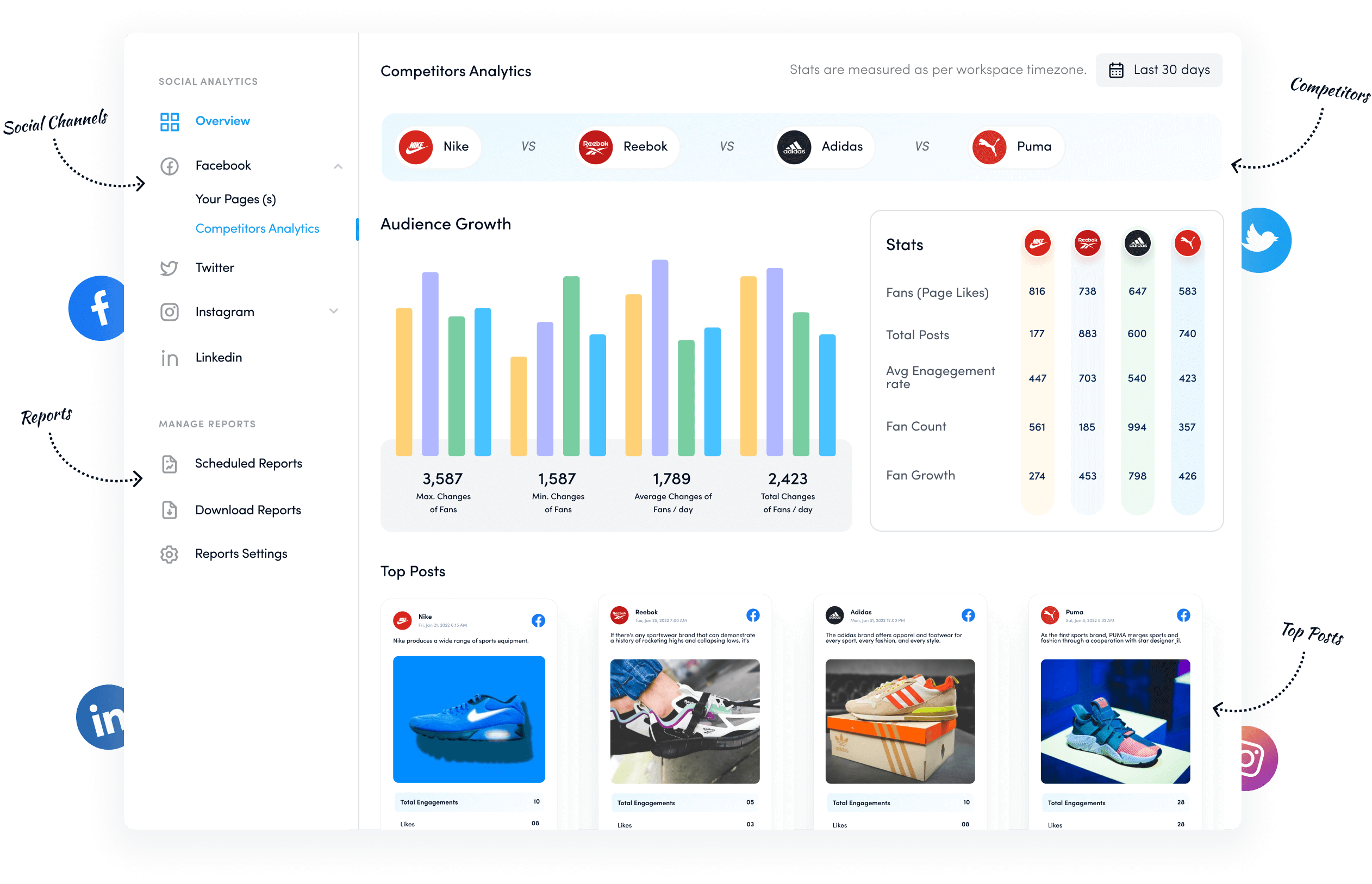
Where to find X(Twitter) impressions data?
You can find X(Twitter) impressions data for your account and individual tweets natively on the Twitter desktop web app and mobile application.
For finding impressions data over a period of time, navigate to your Analytics dashboard or visit https://x.com/i/account_analytics.
Here, you’ll find your X(Twitter impressions) insights for the past days or even months . But you will require a premium X account for that.

You can also change this time range to find data for another period.
Moreover, Twitter gives you engagement data besides impressions data for your tweets, as you can see from the image shared above.
As for finding impressions for individual tweets, click on the graph icon below the tweet.

You’ll see Impressions data for the tweet as well as more insights.

X(Twitter) impressions vs. reach
When talking about social media metrics, reach is an important metric that often pops up.
Essentially, reach counts how many people have seen your post.
Many people find it confusing to differentiate between reach and impressions and use the two terms interchangeably.
However, there is a stark difference between the two: where reach refers to unique views, impressions include repeated views.
Simply put, reach is the number of people who saw your tweet, whereas impressions are the total tweet views.
For instance, If your tweet is seen by user A once, whereas user B sees it three times, its reach will be two, but the impressions will be four.
For marketers who want to get a solid idea of their X(Twitter) KPIs and make the most of these insights, it is crucial to know the difference between them.
Unfortunately, Twitter only reports you on your post impressions. Twitter analytics does not measure reach.
For success on the application, though, knowing both impressions and reach data is crucial.
After all, impressions are not a surefire way to know how many followers your tweets reach. Meaning: impressions don’t indicate how many folks actually read your tweet. It could be that your impressions are high because a few people have come across your post several times. This is why knowing your reach in relation to your impressions is essential.
If your impressions are higher than your reach and you have good engagement, the higher impression count indicates that you are posting audience-engaging content. This explains why certain viewers are viewing the same tweets multiple times.
It’s also important to know that your reach can never exceed your impressions. It’s always either lower than impressions or equal to them.
Top 10 ways you can increase your X(Twitter) impressions
Now that we’ve covered the basics let’s move on to the meat of the matter. Here are our top tips for rising impressions on Twitter:
1. Post content in a variety of formats
X(Twitter) started out with limited characters for statuses. And now though the character limit has significantly improved, people still enjoy short posts.
The reason is simple: shorter text posts are more easily digestible, increasing their chance of being widely shared. So, post shorter and catchy statuses to get more retweets and, hence, more views.
Don’t limit your content plan to text-based posts; strengthen your X marketing game by sharing graphics, pictures, and videos.
When doing so, don’t just share the exact images you’ve shared on Facebook or another social channel. Instead, edit your pictures and videos to meet Twitter’s size recommendations. For instance, make sure all landscape images are 1600 x 900 pixels wide.
Read up: Social media image sizes for 18 platforms [2025 guide]
This way, you ensure that no part of your image gets cropped off once shared or appears wonky and displeasing to viewers.
Besides visual content, you can create polls to attract participation like:

2. Post content frequently
When it comes to X, frequent posting is essential to stay on top of your audience’s mind. Post 1 to 5 times daily to increase your X impressions and engagement.
While you can publish more tweets, posting too much is a bad idea as it can make you appear spammy.
You don’t always need to create your own content, though — retweet others’ posts to encourage interaction with them.
Also read: Top 15 Tweet schedulers to grow your X account
You can also use an automatic post publisher like to ensure you stay on track with your posting schedule; you can also use an automatic post publisher like ContentStudio.
Here’s a quick glimpse at how it works:
- Sign up with ContentStudio and connect your X(Twitter) account.
- Open the post composer at the top of the page. From here, either queue the post, schedule it or publish it.

This way, you can keep your holidays to yourself without compromising your posting frequency.
3. Post content that’s relevant to your audience
Share tweets they’ll likely enjoy to get your target audience to consume your X(Twitter) content rather than scroll past it.
You can follow the 80/20 social content rule here. According to it, 80% of your posts should be entertaining or educational for your audience, whereas 20% of your content should be for marketing your business.
But wait — how to know what type of content exactly will resonate with your audience? For a start:
- Study your competitors to see what they’re posting
- Dive into your X analytics to find what type of content your audience is most interested in seeing
- A/B test with different content types to see what works for your business
Remember though: your content should always be on-brand and follow your unique brand voice.
Social Media Analytics
Fine-tune your social media strategy for success with in-depth analytics and white-labeled reports.
Get Started for FREE
Take Chipotle as an example here. The fast food restaurant always stays true to its humorous voice on social media, making its tweets instantly recognizable and fun.

Also read: How brands boost X(Twitter) engagement with humor
4. Get chatty on X(Twitter)
X gives you so many ways to network and engage with more people.
Apart from responding to tweet replies and leaving comments, participate in X(Twitter) chats. These are niche-specific conversations that happen at allotted times between Twitter folks interested in the chat.
For instance, content marketers and writers regularly have the #ContentClubUK chat. Participating in such a chat helps increase engagement and X impressions and network with people in the industry simultaneously.
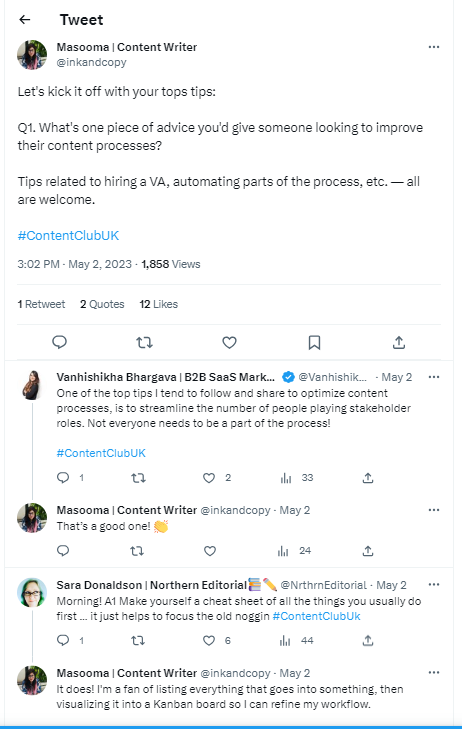
Another way to increase impressions on X is by joining and engaging with people in Twitter Spaces. These are audio conversations in which you can listen to audio messages from other participants and record your own messages to respond.
Related read: How to positively handle negative comments on social media?
5. Jump on relevant trending hashtags
Anyone on X knows that trending hashtags are listed prominently on the screen when you use the app.
So, if you see any trending hashtag on which you can create relevant content, post away!
Your impressions will increase when people search for the hashtag and come across your tweet. Moreover, using trending hashtags can also help bring in new followers.
But this isn’t even the best part. If your tweet is unique and engaging enough and the hashtag gets discovered and retweeted multiple times, you can experience a boom in your impressions and engagement.
Check out how Xbox has gotten creative and tweeted about #MetGala even though the trending hashtag isn’t related to its niche.
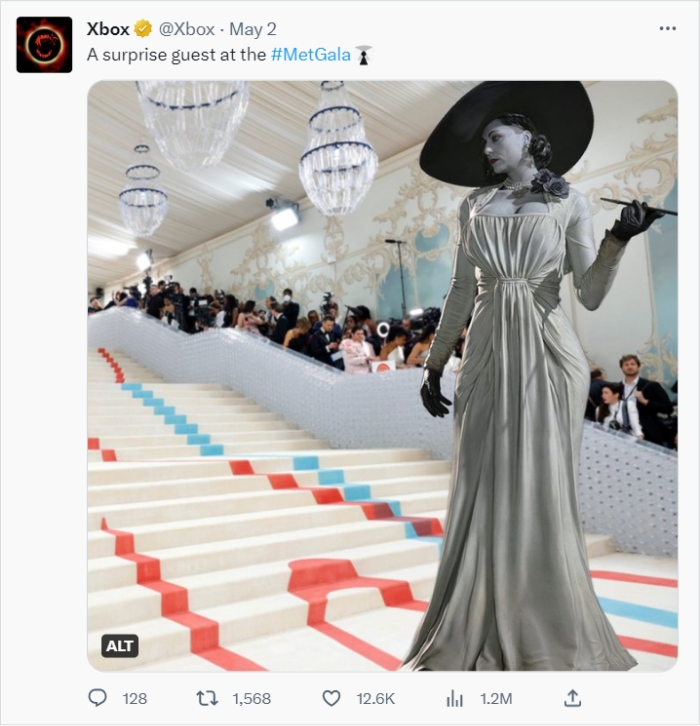
6. Tap into micro-influencer marketing
Instagram isn’t the only place where influencers hang out. In fact, you can also collaborate with influencers on X.
Start by interacting more often with influencers in your niche. To get noticed, you can retweet their tweets or reply to them more often.
Sometimes influencers may even give you a retweet themselves if you’re on good enough terms, which benefits both parties.
Pro tip: Focus on micro influencers rather than mega influencers to grow your business. These are smaller influencers with followers of less than 100K.
The biggest perk of working with them is that they often have a higher engagement rate but charge nominally since their following isn’t too big.
What’s more, micro-influencers are also more flexible, which makes it easier for smaller businesses to work with them.
This doesn’t mean that business giants can’t benefit from micro influencers though. Look at how Grammarly, a leading grammar software, has partnered up with micro influencer Tina Donati who has 11.3K followers on the bird app.
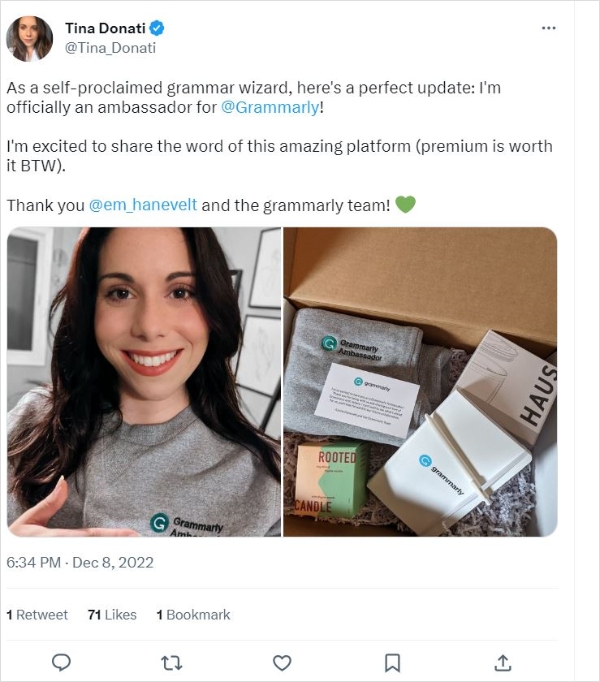
7. Post when your audience is active
As a marketer, always aim to post when your audience is most likely to interact rather than when you find it convenient.
If you post when your audience is inactive, your tweets will drown in the tweet sea and hardly get any impressions.
So what are the best times to post on X(Twitter)? Here’s how to find the ideal posting time for your business:
- Study when your competitors are posting
- A/B test to see what times bring in the most impressions and interactions
- Dive into Twitter analytics to see when your audience is online
If you’re using ContentStudio for scheduling your posts, though, you don’t have to take on the manual work of finding the best time to post on Twitter since the tool gives you ‘Best time to Post.’ This way, you can schedule your content for posting at times when your content will get the most engagement.
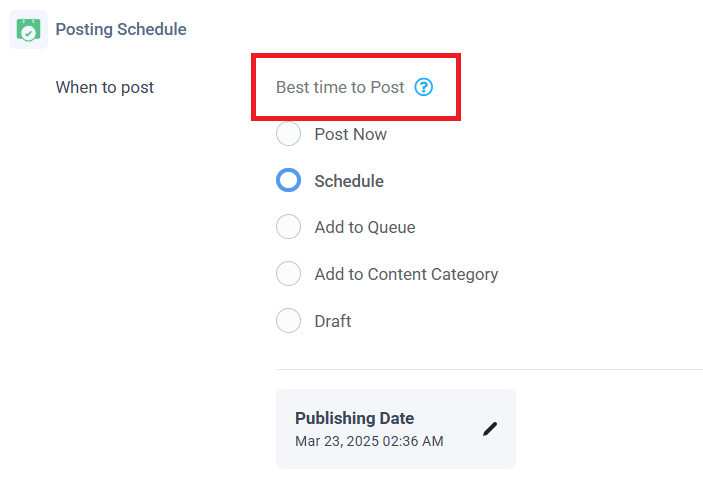
Also read about Instagram impressions.
8. Implement carousel-style image tweets
Create multi-image tweets like a carousel to tell a story or present information in a swipeable format. Design your carousels with a clear narrative flow—start with an attention-grabbing first image, as this is what appears in feeds.
Use consistent design elements across all images while ensuring each slide delivers unique value. For maximum impact, include clear calls-to-action on the final slide to direct users toward further engagement with your profile.
9. Schedule “Second Chance” tweets
Repurpose your best-performing content with different headlines, images, or angles. Create a systematic approach to repurposing successful tweets—maintain a database of your highest-performing content and schedule variations across different time zones and days of the week.
When repurposing, extract different insights or statistics from the same source material to provide fresh perspectives while reinforcing your key messages.
Social Media Content Calendar
Stay consistent and organized with Contentstudio’s social media content calendar for marketers and agencies.
Get Started for FREE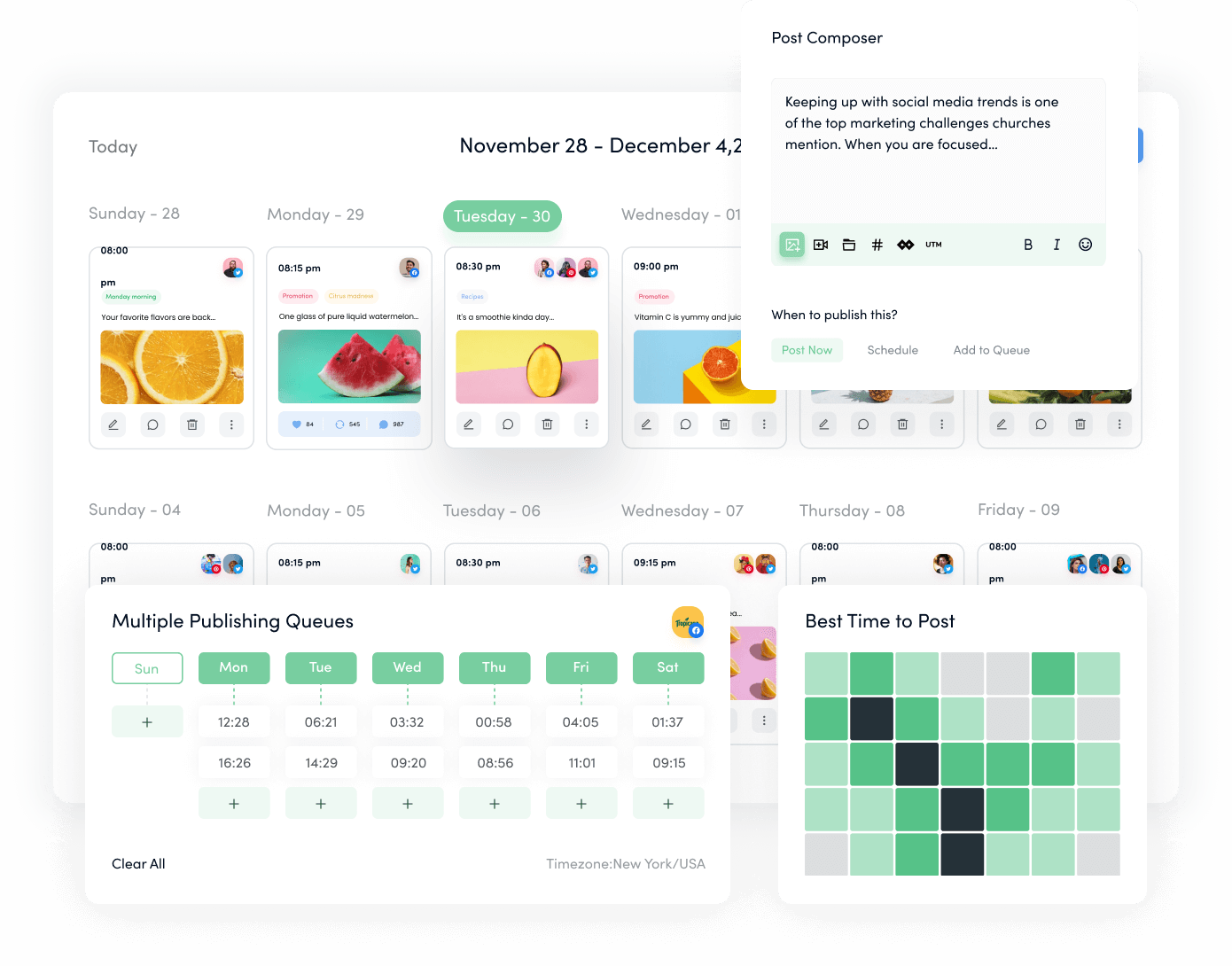
10. Build strategic relationships
Develop genuine connections with accounts in your niche through regular engagement. Identify 10-15 key players in your industry and interact with their content consistently through thoughtful comments and shares.
These relationships often lead to retweets and amplification of your content to entirely new audiences. Be authentic in your approach—offer value before asking for anything in return.
Read more: How to leverage social media influencers to discover new audiences
Content Discovery
Find the top-performing content on the web and never run out of social media post ideas.
Get Started for FREE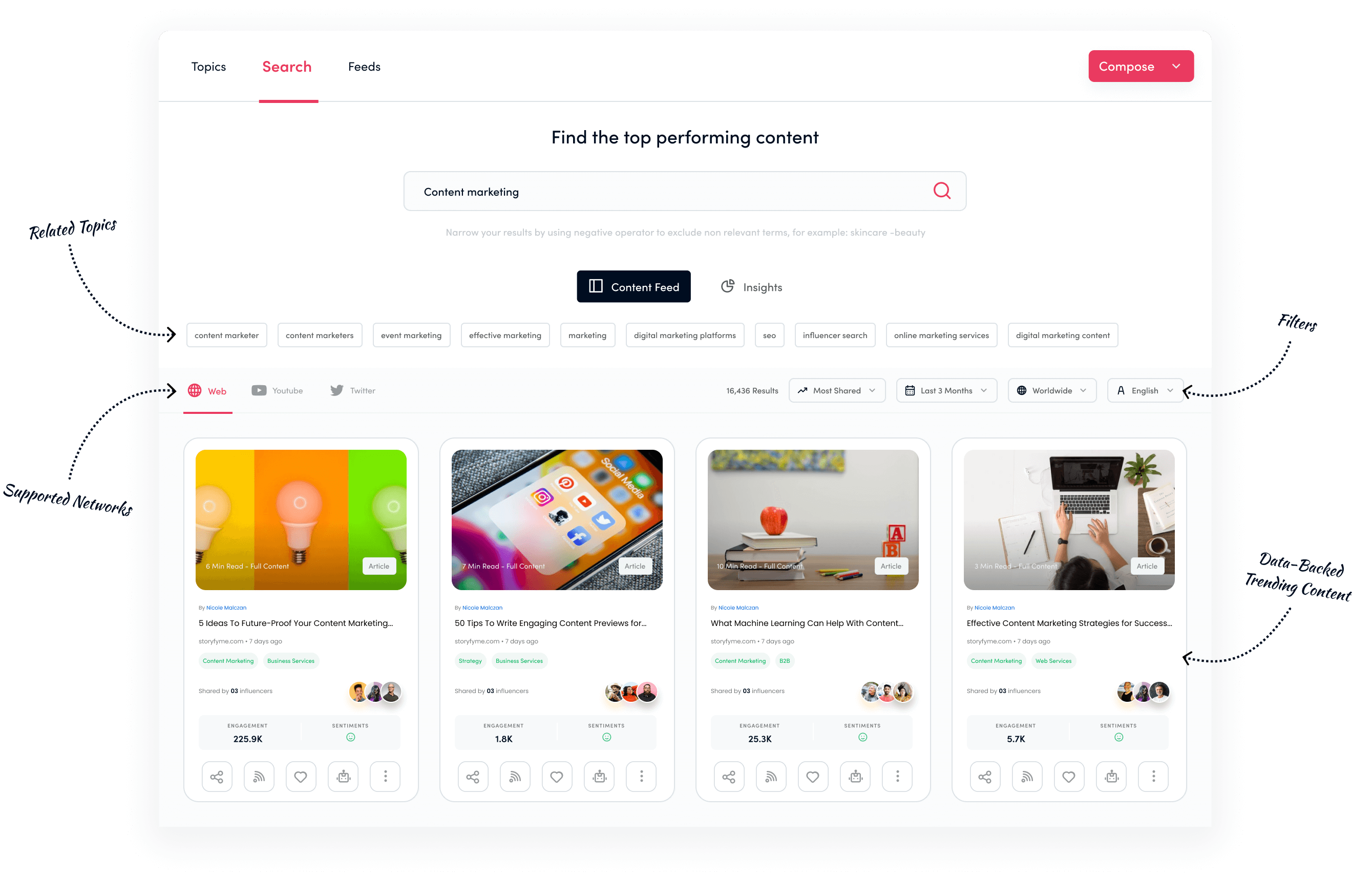
Ready to increase your X(Twitter) impressions?
To wrap up, X(Twitter) impressions are the total views on your tweets. These include repeated views from the same user, unlike reach, which measures unique views.
Analyzing impressions alongside reach and engagement metrics can help you understand your X performance.
To increase your impressions, aim to post audience-relevant content frequently, that too in a variety of formats. Also, use trending hashtags, engage + network more on the application, and tap into influencer marketing.
The good news: you can find X(Twitter) impressions data natively within the app. For in-depth analytics, use a third-party tool such as ContentStudio analytics.
Simplified social media marketing for individuals & agencies.
Try ContentStudio for FREE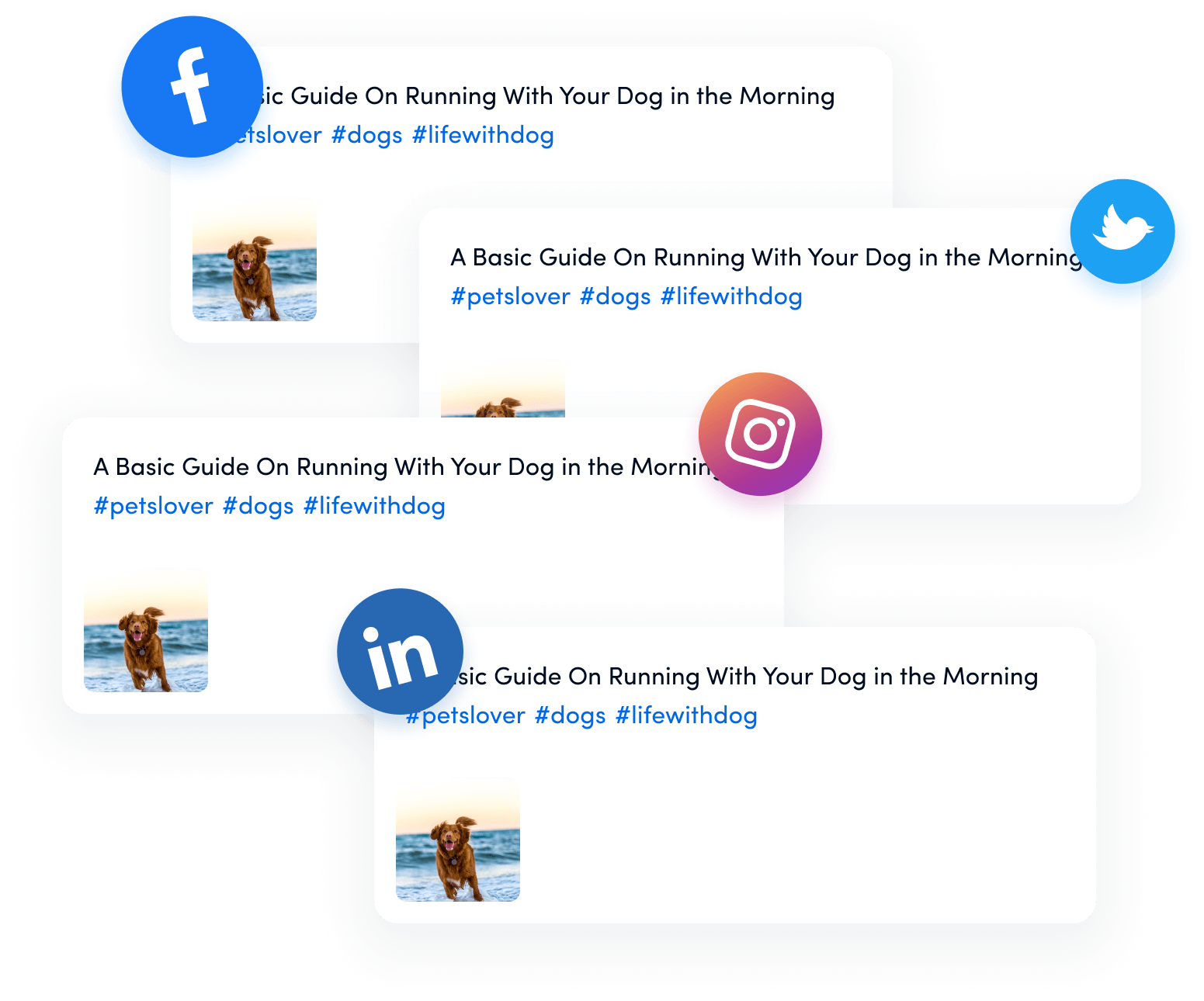
FAQs
- What are impressions on Twitter?
Impressions on Twitter refer to the total views your tweets receive within the app. If anyone views your tweet on their timeline, as a tweet response, or in the search results, their view counts as an impression. Unlike reach, Twitter impressions include repeated views as well.
- How to get more impressions on Twitter?
Post content more frequently to increase your X impressions. Participating in X(Twitter) chats and Spaces is also a great way to increase engagement and impressions on X(Twitter). What’s more, getting chattier with influencers and industry leaders helps. You can also try micro-influencer marketing to increase your impressions on the app.
- What does 3 impressions mean on X(Twitter)?
Three X impressions mean three views on your tweet. Impressions include repeated views, so receiving three impressions could mean that the same person has viewed your tweet three times. It could also mean that three different people have viewed your content. You’ll have to measure reach data to determine how many people have viewed your content.
Recommended for you

How social media AI image generation saves time & inspires creativity
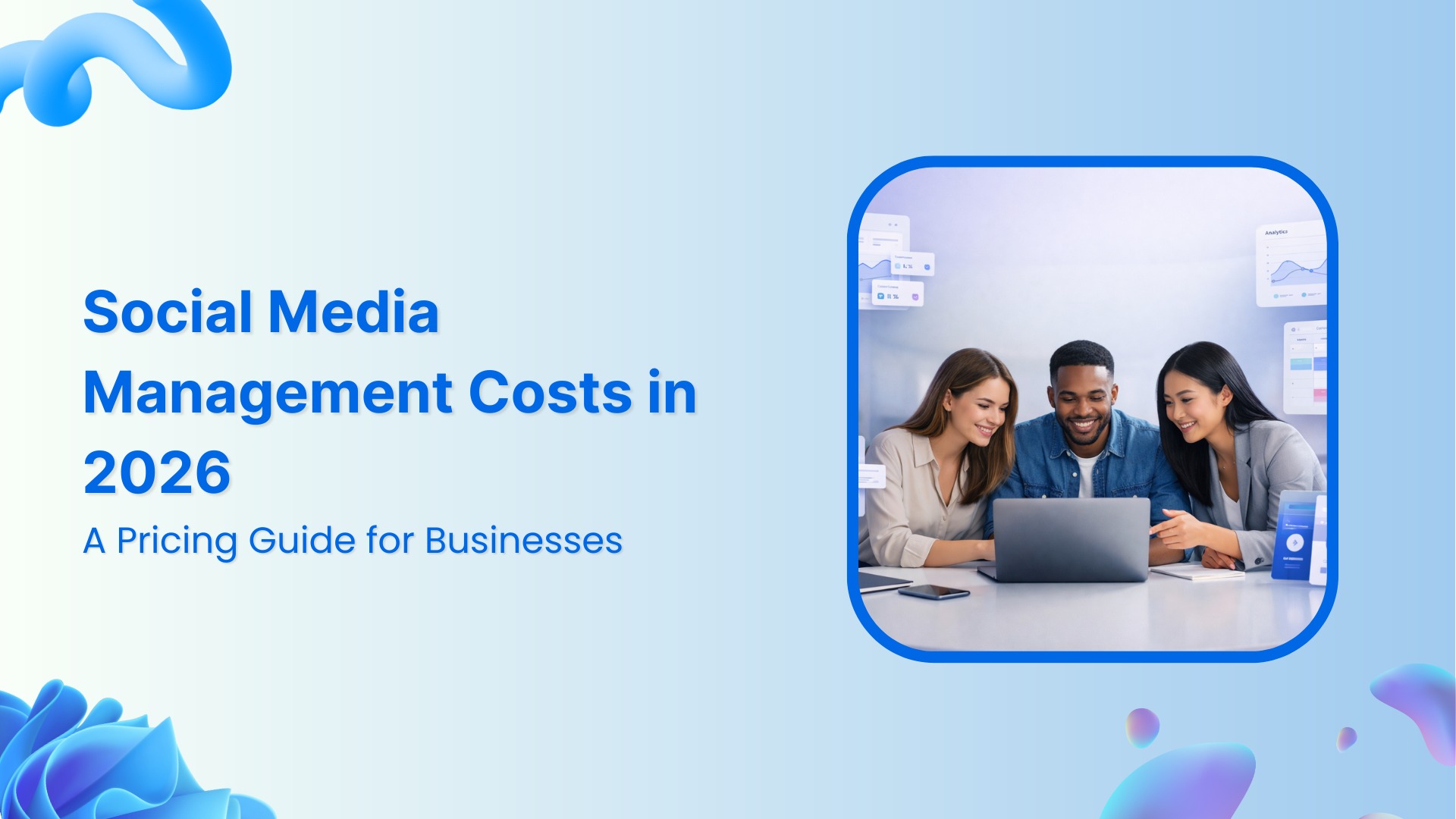
Social Media Management Costs in 2026: A Pricing Guide for Businesses

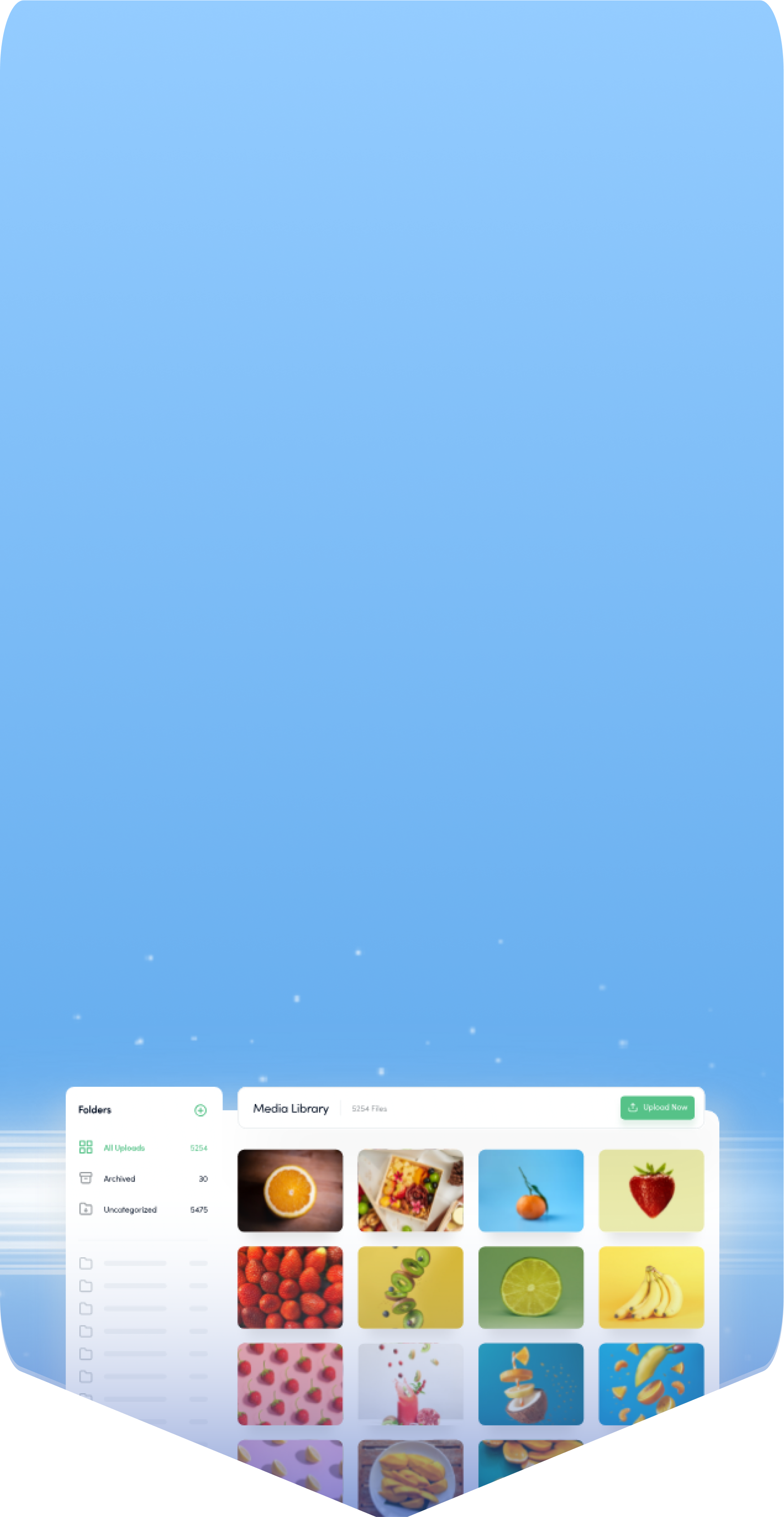
Powerful social media management software
7-day free trial - No credit card required.
